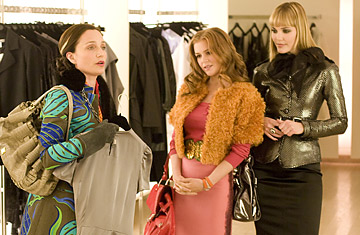
From left: Kristin Scott Thomas, Isla Fisher and Leslie Bibb in Confessions of a Shopaholic
Long, long ago, in a very different economy, there were people called shopaholics. They wielded credit cards and wore shoes so ugly that they came to be considered beautiful. A few of these creatures can still be found toting small dogs in Los Angeles or being led around New York City by Tom Cruise, but their ranks are presumably diminishing at the same rate as your 401(k).
Perhaps, then, it's a good thing they have been commemorated in Confessions of a Shopaholic, a movie adaptation of Sophie Kinsella's series of novels about a shopping-obsessed, debt-ridden young English journalist named Becky Bloomwood (Isla Fisher). As a romantic comedy, it is forgettable. But as an ill-timed anthropological artifact, Confessions offers weird pleasures, not least among them the fact that it makes us root for the debt collector. (See 25 people to blame for the financial crisis.)
Reframed in the movie as an American, Becky is a classic case of the aspirational shopper, scarred by a childhood full of sensible brown shoes and thrift-store shopping with her mother (Joan Cusack, who in real life is all of 14 years older than Fisher). "When I shop, the world gets better," Becky says dreamily. "And then it's not, and I need to do it again."
Isn't that exactly what they told us the week before Christmas? And we didn't shop — and look how much worse the world got. Maybe Becky is on to something. Certainly her new editor, Luke (Hugh Dancy), thinks so. Oblivious to her $16K in debt, he hires her to write for Successful Savings magazine right after she's been laid off from a gardening magazine that's being shuttered (the movie's first and only nod to reality in the world of media). He likes her sort of Everywoman approach to consumerism and forgives her complete ignorance of actual finances.
Naturally, her column is an instant hit. This might be less absurd if we were privy to their content, but director P.J. Hogan probably didn't want to trouble the American moviegoing public with such details. That Becky and Luke (who happens to be rich — he's basically a walking lottery ticket) will fall in love is also a given, but that's a touch harder to swallow. It's not that Dancy isn't cute — he is, like a smaller, more delicately featured Hugh Grant — but simply because Becky seems more interested in mannequins than in men. There's nothing womanly about any of her getups; they're more like costumes put on by a little girl playing dress-up. She's not looking for a boyfriend; she's looking for a $120 scarf that, as she says in voiceover, can help define your psyche.
There's no evidence that Becky ever really questions this point of view. Maybe that's why we ultimately find a character we're presumably supposed to hate, the collection agent doggedly pursuing her, so sympathetic. Angular, angry Derek Smeath (Robert Stanton) has been driven to the brink by Becky's inexcusable number of excuses. When he finally pounces, the satisfaction is akin to seeing your little sister get spanked for reading your diary.
Fisher, an Australian actress whose breakthrough moment happened around a dinner table with Vince Vaughn in Wedding Crashers, is a nifty performer. Her charms are enough to keep the movie — entering the marketplace just as the country's financial situation becomes truly dire — from being criminally distasteful. She's got that rare gift for making slapstick seem organic. Confessions runs her through the chick-flick moves of endearment (walk into glass, run in high heels, spill food on self and others), but there are a few scenes where she cuts loose and we get to see her Lucille Ball–style warmth and wackiness. It's a simple pleasure to watch Becky attempt to retrieve a wrongly addressed envelope before it lands in the hands of her idol, fashion-magazine editor Alette (Kristin Scott Thomas, doing the haughty Devil Wears Prada thing very, very well).
The movie's other saving grace is that Becky has absolutely hideous taste. Whether this is intentional, only costume designer Patricia Field (Sex and the City) knows for sure. What Carrie Bradshaw might have pulled off, Becky sinks under. Colors, plaids, accessories, boots — it's all garish; she doesn't wear or carry a single appealing object for the length of the movie. This is oddly comforting. We're officially 14 months into this recession, and many of us are not just tightening belts but swearing off shopping altogether. Confessions, perhaps inadvertently, assures us that being deprived of Gucci boots can be a good thing.
